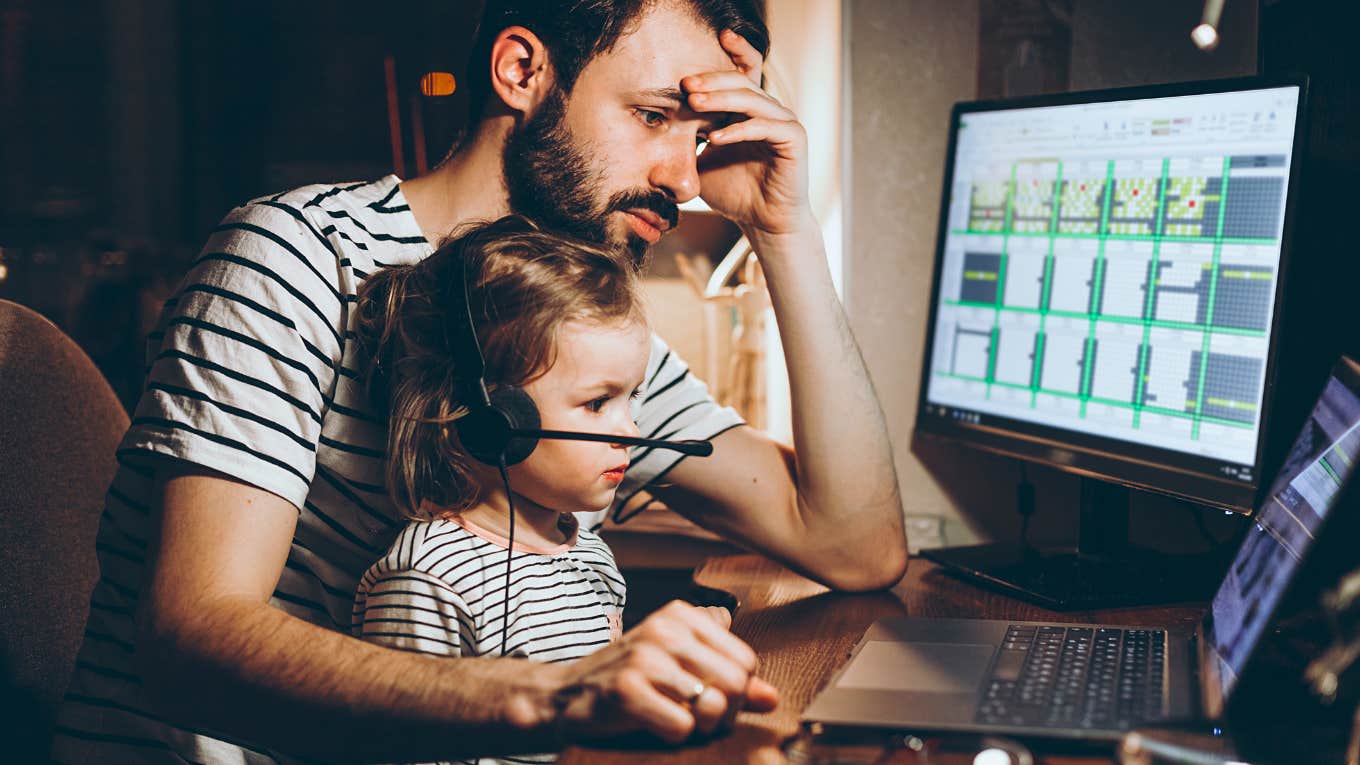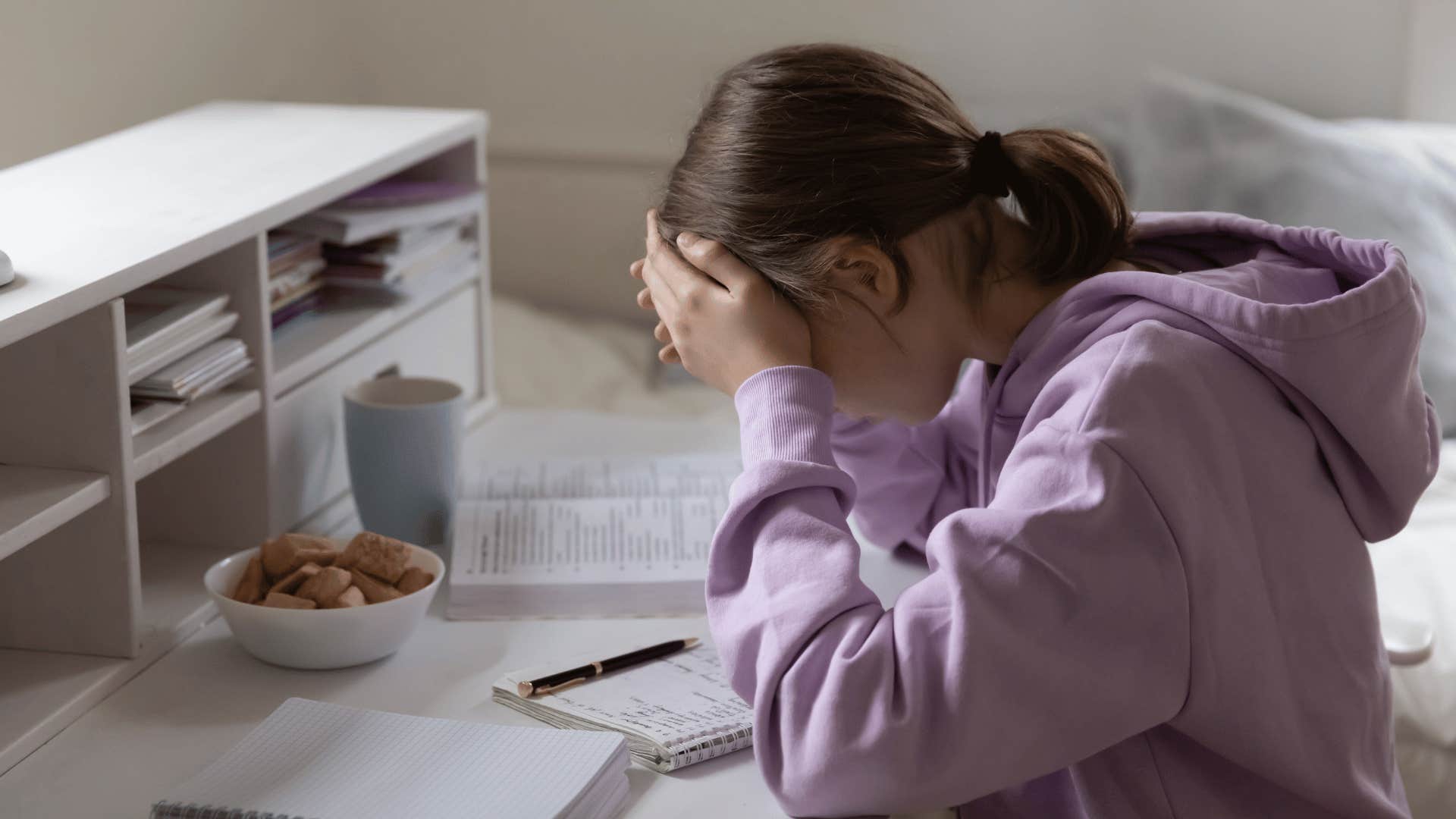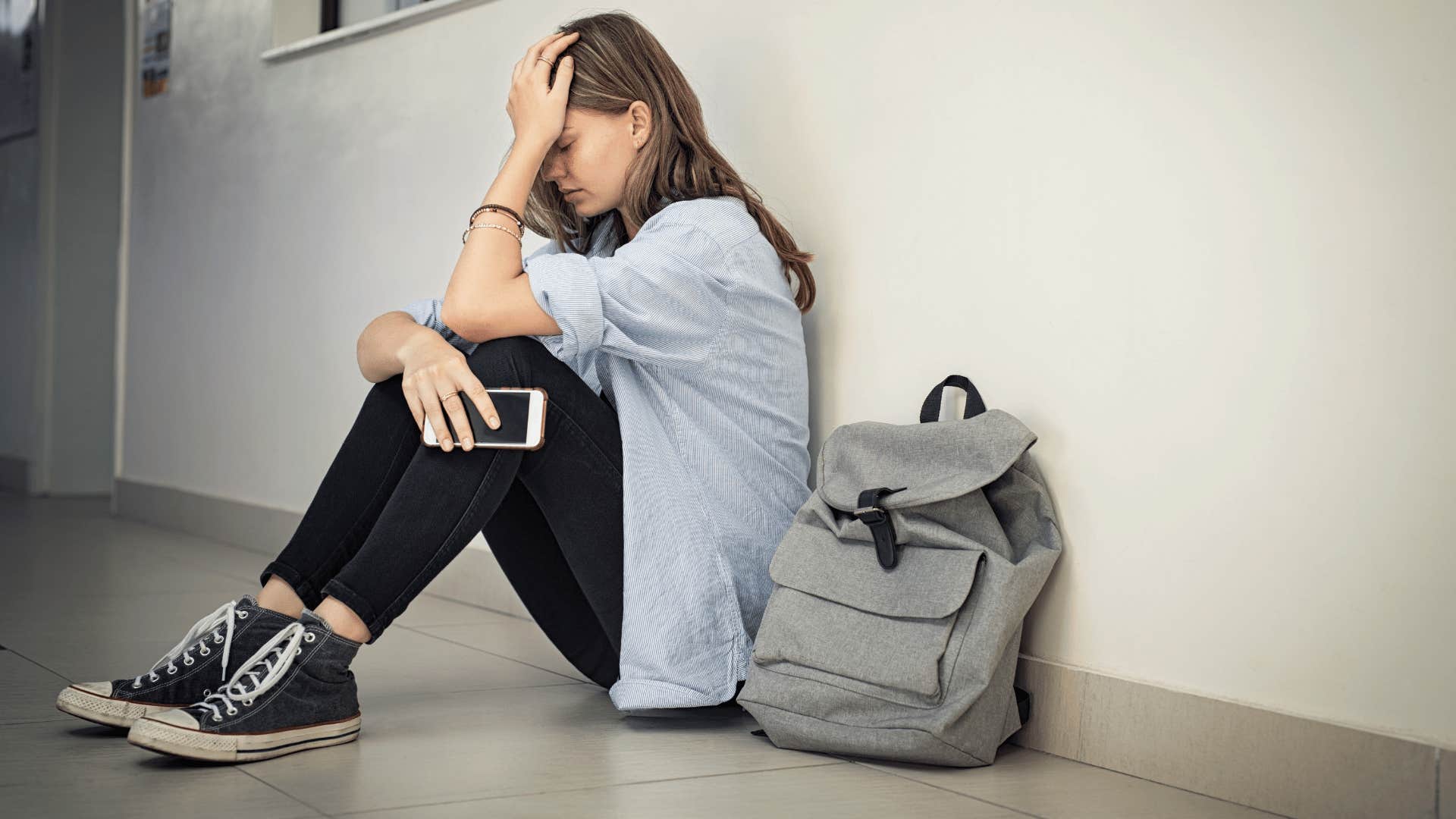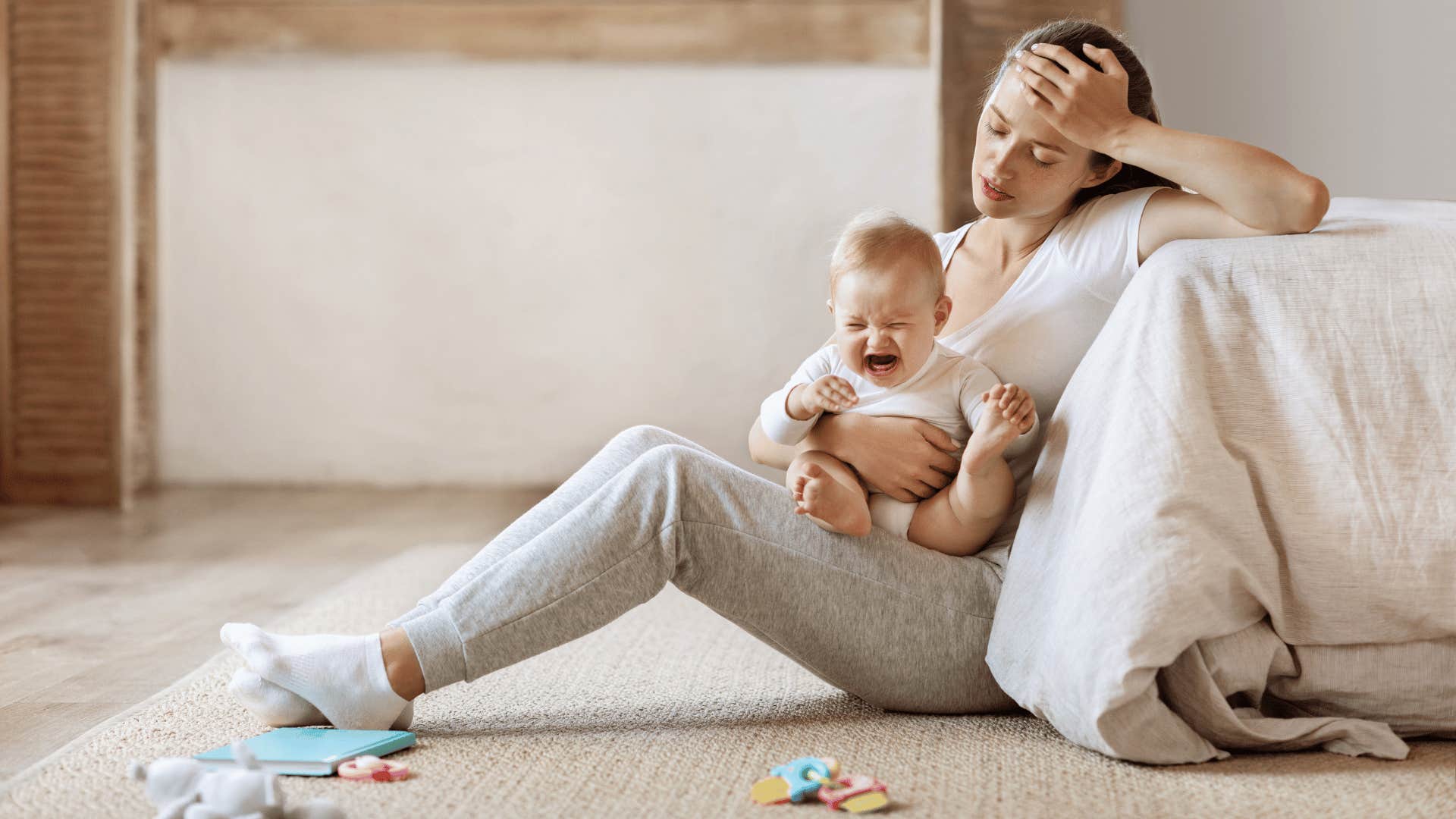10 Sad Ways Being A Parent Has Changed Drastically Since The 1980s
The world is constantly evolving, and parenting today looks vastly different than it did in the 1980s.
 Anna Nass / Shutterstock
Anna Nass / Shutterstock Every era of parenting has its own sets of challenges. It’s easy for parents today to look back with nostalgia and lament how much easier raising kids used to be, and many of their complaints hold water. While certain advances have made parenting easier for Gen Xers and millennials, there are a number of sad ways being a parent has changed drastically since the 1980s.
Today’s parents and children have more access to technology than any past generation, which carries positive and negative implications. Parents can connect on social media and normalize the messier parts of family life, but being on social media also leads to harmful comparisons, which only serve to make parents feel inferior. No matter how you look at it, raising kids is a challenge, even for parents who look perfect online. While some parts of being a parent have gotten easier over time, the pressure to be perfect looms much larger than it used to.
Here are 10 sad ways being a parent has changed drastically since the 1980s
1. Kids are over-scheduled
 fizkes | Shutterstock
fizkes | Shutterstock
One sad way being a parent has changed drastically since the 1980s is how over-scheduled today’s kids are. The '80s saw the rise of latchkey kids, who came home after school to any empty house. They were left to entertain themselves, which meant watching hours of television or playing Atari until their thumbs were sore. It also meant roaming around the neighborhood with no supervision, just a gang of kids on bikes, feeling the sweet sense of freedom and the wind in their hair, since no one wore helmets back then.
While there are many aspects of Gen X childhoods that would be classified as neglect today, '80s kids had way more free time, which was hugely beneficial for their social, physical, and emotional development. According to research, unstructured play is “a fundamental necessity.”
Unstructured play includes activities that aren’t organized by adults and have no defined outcome or purpose. Playing tag, swinging, and jumping can help kids learn to take risks and manage their emotions. Playing with other kids teaches them empathy and cooperation, while making them feel accepted and connected. Creative and imaginative play gives kids a chance to understand the world around them and their place within it.
Yet kids today spend most of their free time going from one structured activity to the next. There’s always a soccer game or ballet practice or piano lessons, which means they have less time to just be. Parents, too, feel the effects of over-scheduling: After all, they’re the ones driving the carpool. While there are certainly benefits to organized group activities, kids suffer when they don’t have time to play on their own.
2. There’s more ‘mom shame’
 fizkes | Shutterstock
fizkes | Shutterstock
Another sad way being a parent has changed drastically since the 1980s is the increase in “mom shame,” which is correlated to the rise of social media. For every post a parent makes about embracing their messy home or announcing their gentle parenting style, someone leaves a comment about how they’re doing it wrong or how they’re harming their kids. Moms, especially, feel the immense weight of societal pressure to be perfect. While comparison culture doesn’t only affect parents, social media creates an echo chamber, where parents’ mistakes and victories are amplified, for the world to see.
According to YourTango’s survey on comparison culture, 62% of participants said that comparing themselves to others was super problematic or somewhat problematic in their lives. Over 71% said social media was the biggest contributor to comparison culture, and 89% said the issue is worse now than in the previous decade.
“What we are experiencing today is learned behavior," Roland Legge, a life coach, explains. “What is wired into us is the need to be in the community and build relationships with others. For millennia, people have compared themselves to others, but with social media, it has become toxic.”
In the 1980s, parents had no real way to know what the inside of anyone else’s home looked like unless they were invited in. While comparison is a normal human instinct, the existence of Instagram and MomTok heightened comparison to astronomical levels.
3. Kids have less autonomy
 Liderina | Shuttertstock
Liderina | Shuttertstock
Kids have less autonomy now than those in previous generations had. Gen X kids walked to school unsupervised or waited for the bus all on their own. Some Gen X kids even ran errands on their own, heading to the corner store for milk or a carton of eggs on their mom’s orders.
Kids spend less time alone now, which impacts their sense of self-sufficiency. This attentiveness of parents who are always watching their kids can mean mothers and fathers are more present and emotionally available, but it also translates to parents stepping in and solving their kids’ problems for them, preventing them from learning how to settle conflicts by themselves.
Gone are the days when parents took the baby monitor to the neighbor’s house after the kids went to bed, which wasn’t the safest parenting decision, but it did give parents a much needed break, allowing them to reset and center their own emotional needs.
4. Kids have more academic pressure
 Ground Picture | Shutterstock
Ground Picture | Shutterstock
Kids now have way more academic pressure put on them than past generations had. In an '80s kindergarten classroom, making macaroni necklaces and building block towers were top priorities. Now, kindergarteners are expected to have a grasp on basic literacy right off the bat, which shows just how much times have changed.
Academic expectations are much steeper now than they were in the 1980s. Kids are expected to meet rigorous standards. They take state-wide standardized testing, and depending on their level of privilege, many kids start prepping for the SATs way before their junior year of high school. College has become basically unaffordable for most families, and preschool is the cost of a college education, which makes getting into school at any age significantly more competitive.
The immense pressure put on kids can lead to serious mental health issues, like depression, anxiety, and burnout from academic stress, all of which make parenting more complicated than in the past.
5. There’s less community support
 Dima Berlin | Shutterstock
Dima Berlin | Shutterstock
Another sad way being a parent has changed drastically since the 1980s is the lack of widespread community support. In the '80s, it was common for grandparents to help raise kids. Tight-knit neighborhoods helped carry the weight of parenting, with one mom watching a gaggle of kids one day, and another mom a different day.
Now, the village has grown smaller, almost to the point of being non-existent. Families live far away from each other. The cost of childcare has sky-rocketed. Parents today are more isolated than they were in the 1980s, which is a sad reality of modern parenting.
6. Parents have higher anxiety
 Monkey Business Images | Shutterstock
Monkey Business Images | Shutterstock
It’s not an exaggeration to say we live in an extremely stressful era, where political and economic uncertainties loom large in everyone’s collective imagination and lived experience. Gen Xers may never forget where they were when the Challenger exploded, but kids today have experienced worldwide grief and loss in unprecedented waves.
Parents today — as well as their kids — experience higher anxiety than past generations. The existence of the 24 hour news cycle, along with instantaneous access to information, might keep parents in the know more readily, but it also raises their stress and existential anxiety in ways that feel virtually impossible to combat.
While it feels simplistic to say parenting was less stressful in the 1980s, there is truth to that sentiment. Parents today hold the weight of the world on their shoulders.
7. Managing technology is way more complicated
 Ground Picture | Shutterstock
Ground Picture | Shutterstock
Another sad way being a parent has changed drastically since the 1980s is the massive rise of technology’s influence over people’s lives. In the '80s, people had to stand up and walk across the room to change the channel on their TV. Now, they can swipe their thumb across the screen of their smartphone and control the TV, the stereo, and even the overhead lights. The digital age ushered in massive changes, but not all of those changes are positive ones.
The decisions parents have to make around their kids’ access to technology are way more layered now than they were in the '80s. It’s no longer about having Nintendo or a phone shaped like a cheeseburger. The implications are way heavier. What age should kids get their first cell phone? How much screen time should they be allowed to have? Parents can track their kids’ movements with their phones, something that both alleviates anxiety and increases it.
Today’s kids have access to technology that kids in the past could never have dreamed of having. According to a study titled “Effects of Excessive Screen Time on Child Development,” kids in the 70s started engaging with media regularly at four years old, while now, kids start interacting with media and digital devices starting at four months old. The negative effects of too much screen-time have been well-documented by now. There are major cognitive and socio-emotional consequences that only digital natives have experienced.
8. Raising kids is more expensive
 fizkes | Shutterstock
fizkes | Shutterstock
Another sad way being a parent has changed drastically since the 1980s is the intense increase in how much it costs to raise children. According to an archived New York Times article published in 1983, the USDA reported that raising a baby in 1980 would cost a family between $69,232 and $76,655. Raising a baby born in 1982 would cost between $80,926 and $89,720.
In 2024, raising a child born to a middle-class married couple could cost $312,202, if not more.
The cost of having kids has become prohibitively expensive, to the point where young people are deciding not to have any because they can’t afford to raise them. While taking your economic standing into consideration is an important part of having kids, money shouldn’t be the sole deciding factor for prospective parents.
9. Parents have less time for themselves
 Prostock-studio | Shutterstock
Prostock-studio | Shutterstock
Many parents in the 1980s could be described as having a laissez-faire approach to raising kids. If their kids made it through the day in one piece without destroying the house, it was considered a parenting victory. Now, parents are expected to monitor their kids’ every move or risk being called a bad parent, which means they have way less time for themselves.
If '80s kids said they were bored, their parents told them that being bored meant they were boring. If today’s kids express boredom, their parents dive in head-first: They play games and dress up like superheroes. They don’t just watch their kids play in the backyard, they go outside with them to watch what they’re doing.
While paying attention to your kids and meeting their needs is, without a doubt, critical to parenting, being too attentive can negatively affect children’s ability to emotionally regulate themselves and solve problems on their own. Research has found that helicopter parenting denies kids the space they need to manage their emotions and behavior.
“Our research showed that children with helicopter parents may be less able to deal with the challenging demands of growing up,” lead researcher Nicole B. Perry explained. “Children who cannot regulate their emotions and behavior effectively are more likely to act out in the classroom, to have a harder time making friends and to struggle in school.”
While kids need their parents’ guidance, they also need to build a sense of self-efficacy, which they can’t do when their parents are hovering around and telling them exactly what to do. Not only that, the excessive time and energy parents spend on their kids shifts their attention away from their own emotional and practical needs. Hyper-focusing on their kids’ well-being means they aren’t necessarily taking care of themselves.
10. There’s more parental guilt
 Indypendenz | Shutterstock
Indypendenz | Shutterstock
No matter what era parents are in, guilt is part of the process. There’s always so much to worry about. Are my kids happy? Are they being bullied? Will they ever eat broccoli? While parents might not ever get clear answers to some of their more existential questions, they never actually stop worrying, which can lead to them feeling guilty.
Working parents feel guilty for not being around. Stay-at-home parents feel guilty for not having jobs. Parents feel guilty for things they do and things they don’t do. And while some of that guilt is to be expected, societal pressure and social media exacerbate that guilt, until it becomes too heavy to bear.
So many parents today feel inadequate. They wonder if they’re making the right choices for their kids. Yet the truth is, there’s no way of knowing. There’s no one answer. All parents can do is the best they can, at this moment, with the tools they have. All they can do is offer love and warmth and unconditional support, and that, in itself, is enough.
Alexandra Blogier, MFA, is a staff writer who covers psychology, social issues, relationships, self-help topics, and human interest stories.

